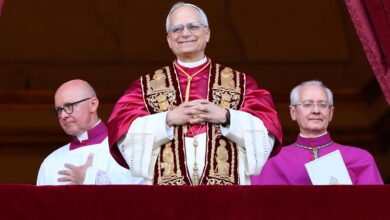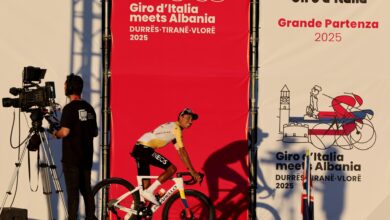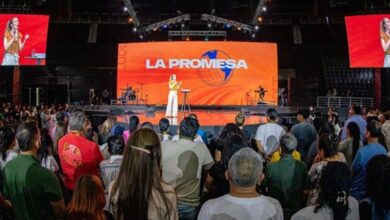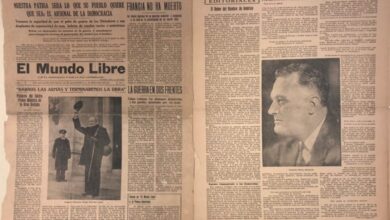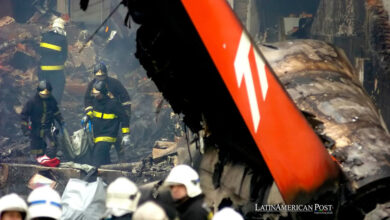The Venezuelan crisis and the meeting of the Lima Group
Listen this article
In response to the weekend, the Lima Group met in Bogotá to discuss the Venezuelan situation

On February 25, several representatives of the countries belonging to the Lima Group met in Bogotá to try to provide a viable solution to the crisis that is occurring in Venezuela. The governments of Argentina, Panama, the United States, Canada, Paraguay, Chile, Brazil, Colombia, Honduras, Guatemala, and Venezuela met in order to "contribute to the process of democratic transition and the institutional, economic and social reconstruction of the Republic Bolivariana de Venezuela", as highlighted by El Espectador.
Leer en español: La crisis venezolana y la reunión del Grupo de Lima
However, the meeting was in the eyes of everyone, because they were discussing the possibility of carrying out a military intervention in Venezuela, thus ending the regime of Nicolás Maduro, which has plunged the country into a humanitarian crisis; situation that did not improve with the impediment of the entrance of humanitarian aid expected to enter on February 23. In this way, from very early on, the European Union made the call not to carry out military intervention.
According to Maja Kocijancic, spokesperson for Federica Mogherini and who serves as the Union's representative for Foreign Affairs and Security Policy, said that "we must avoid military intervention (…) which is explicitly quite clear, since our point of view, is that we need a peaceful, political and democratic resolution and Venezuelan property of this crisis (…) this obviously excludes the use of force", he said, according to AFP.
Maybe you're interested in reading: Absurd measures: Venezuela says goodbye to Colombia
What the meeting left
The meeting concluded with a record of 18 points, where the most important was number 16, since the Lima Group "reiterates its conviction that the transition to democracy must be conducted by the Venezuelans themselves peacefully and within the framework of the Constitution and international law, supported by political and diplomatic means, without the use of force", according to El Tiempo.
In this way, military intervention was not an option, which was mainly promoted by the opposition Julio Borges, and which had been considered by Donald Trump, when he manifested it in the meeting with Iván Duque on February 13.
On the other hand, they also affirmed that actions will be promoted before the International Criminal Court (ICC), since it is important "to take into consideration the serious humanitarian situation in Venezuela, the criminal violence of the Nicolás Maduro regime against the civilian population, and the denial of access to international assistance, which constitutes a crime against humanity".
Despite tensions and international pressure, the Lima Group opted for a diplomatic solution, asking for the recognition of Juan Guaidó as president, and even proposed a plan for economic reactivation "in the hands of the Inter-American Development Bank. In the statement, they also called for the restoration of democracy and freedom in Venezuela", according to RedMás Noticias.
Pence and the three key points
At the meeting, which included the participation of interim president Juan Guaidó, the vice president of the United States, Mike Pence, highlighted the importance of three key points to deal with the situation in Venezuela. There, he stressed the importance of immediate freezing Venezuela's oil assets in the countries of the region; transfer Venezuelan assets to Juan Guaidó and restrict the delivery of visas to the nearby Maduro circle, according to EfectoCocuyo.
In the same way, he sent a message to the military, highlighting the amnesty granted by Guaidó and affirming that all options were on the table, "they can choose to accept the generous offer of President Guaidó's amnesty to live his life in peace; but, if they choose the other path, they will ultimately be held accountable", according to the same medium.
Alive or dead
According to the tweet of the Colombian journalist Herbin Hoyos, Nicolás Maduro would have asked for the head of Juan Guaidó.
2. EXCLUSIVO VENEZUELA: @NicolasMaduro dio órdenes de entregar vivo o muerto a @jguaido. @dcabellor le dijo a @vladimirpadrino: "si es muerto mejor". Iris Valeras quien estuvo en la frontera, es la encargada de montar el plan para el asesinato de Guaidó cuando cruce la frontera.
— Herbin Hoyos Medina (@herbinhoyos) 25 de febrero de 2019
After Guaidó left his country last weekend, Maduro held an interview with the US media ABC, where he stated that "he will have to face justice, (…) Guaidó can leave and go back and go to having to face justice because it had forbidden him to leave the country". The interim president is expected to return to Venezuela later this week.
Finally, Roberto Ampuero, Minister of Foreign Affairs of Chile, announced that the next meeting of the Lima Group will be in Chile; although he did not give a date for the meeting.
LatinAmerican Post | Laura Viviana Guevara Muñoz
Translated from "La crisis venezolana y la reunión del Grupo de Lima"

